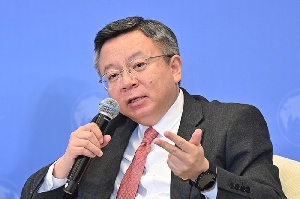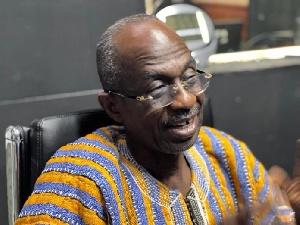Africa News of Friday, 6 June 2025
Source: www.ghanawebbers.com
Rwanda's Economy Remains Strong, Says IMF
Continued fiscal consolidation is vital for Rwanda's economic stability. This was stated by the International Monetary Fund (IMF) Executive Board on June 4. They concluded the fifth review under the Policy Coordination Instrument (PCI).
Rwanda's economic growth remains strong in sub-Saharan Africa. This is despite rising fiscal and external pressures from large investment projects.
In 2024, Rwanda's economy grew by 8.9 percent, surpassing the projected 8.3 percent. Growth was driven by a rebound in agriculture and strength in services and construction. Inflation stayed within the National Bank of Rwanda’s target of 2-8 percent due to tight monetary policy.
The IMF noted that Rwanda met all quantitative targets set for reforms. Most commitments were implemented, including governance improvements in state-owned enterprises (SOEs). However, there were delays in approving the comprehensive tax policy package and rolling out the Global Master Repurchase Agreement (GMRA).
Rwanda's new tax reforms were published on May 29 after Parliament approval. These include a 15 percent excise duty on cosmetic products and an 18 percent VAT on mobile phones and ICT equipment. There are also increased taxes on gambling revenue and a new tourism tax of 3 percent on accommodation.
Additionally, excise duty on cigarettes rose from Rwf130 to Rwf230 per pack. The beer excise duty increased from 60 to 65 percent of factory price.
Bo Li, IMF Deputy Managing Director, highlighted challenges in implementing reforms amid worsening external conditions. He emphasized that sustaining fiscal consolidation is crucial for macroeconomic stability and debt sustainability.
Li welcomed the new tax reform package as a step toward broadening the tax base. He stressed the need for continued expenditure rationalization and monitoring fiscal risks from SOEs.
On May 8, Finance Minister Yusuf Murangwa reported strong growth momentum despite global challenges like climate change and inflation. He presented a proposed national budget exceeding Rwf7 trillion for the fiscal year 2025/26.
Rwanda's current account deficit widened in 2024 due to high imports of consumer goods but reserves remained adequate at 4.7 months of imports by year-end. The IMF expects pressure on fiscal positions from infrastructure investments like New Kigali International Airport and pension reform.
Public debt is projected to peak at 78.7 percent of GDP by December 2025/26, with a target of achieving PCI debt anchor at 65 percent by 2033. The IMF stressed that accelerating domestic revenue mobilization is essential for long-term fiscal sustainability.











